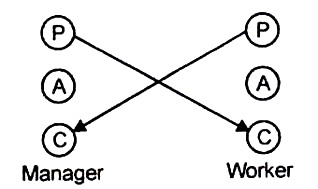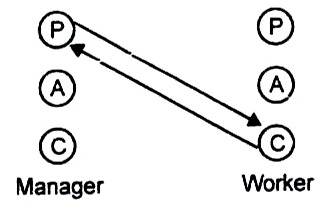When people transact and exchange ideas and information, they are either comfortable or uncomfortable communicating with each other. Transactional analysis is a technique which helps to understand the behaviour of other person so that communication becomes effective. Understanding human behaviour helps to motivate, guide and direct other persons.
Transactional Analysis (TA), thus, facilitates communication. TA studies transactions amongst people and understands their interpersonal behaviour. It was developed by Eric Berne, a psychotherapist. He observed there are several ‘people’ inside each person who interact with other people in different ways.
To understand TA, one should understand the following:
1. Ego States,
ADVERTISEMENTS:
2. Life Position and
3. Analysis of Transactions.
1. Ego States:
It represents a person’s way of thinking, feeling and behaving. There are three ego states present in everyone: child, parent and adult. They are related to behaviour of a person and not his age. However, they are present in every person in varying degrees. There may be more of one ego state than another at a specific point of time. When two persons communicate with each other, communication is affected by their ego states. These are;
(a) Child ego:
ADVERTISEMENTS:
Child behaviour reflects a person’s response to communicate in the form of joy, sorrow, frustration or curiosity. These are the natural feelings that people learn as children. It reflects immediate action and immediate satisfaction. It reflects childhood experience of a person gained generally up to the age of five years.
A child can be:
(i) Natural child:
He is naturally curious, joyous or scornful. He does what comes his way naturally.
ADVERTISEMENTS:
(ii) Adaptive child:
He reacts the way his parents want him to react. He is trained to act.
(iii)Rebellious child:
He has the experience of fear, frustration and anger.
ADVERTISEMENTS:
(b) Parent Ego:
Parent behaviour is acquired through external environment. As young children, their parents’ behaviour remains embedded in their minds which is reflected as parental ego when they grow up. It usually reflects protection, displeasure, reference to rules and working on the basis of past precedents.
This can be:
(i) Nurturing parent ego:
ADVERTISEMENTS:
As nurturing parents, managers praise good performance of the workers. They interact with them and help them during times of distress. They reflect nurturing behaviour towards others.
(ii) Negative or critical parent ego:
As critical parents, managers criticize or ignore poor performance of the workers rather than help them to improve. They have a critical attitude while interacting with others.
(c) Adult ego:
ADVERTISEMENTS:
Adult behaviour reflects the ability to analyse the situation and take logical decisions. He overcomes the emotional feelings and takes decisions based on facts and figures. This state is based upon reasoning, thinking, experience, rationality and discussion based on facts.
It updates the parental ego to determine what is right and wrong and child ego to determine what feelings to express and what not to express. These ego states are present in all human beings at some time or the other. People respond to different situations in different ways depending on their ego state.
2. Life Position:
Behaviour of a person depends upon his experience at different stages of his life. He develops a philosophy towards work from early childhood which becomes part of his identity and remains with him for lifetime unless some external factor changes it. These positions are called life time positions.
They fall into four categories:
ADVERTISEMENTS:
(a) I am OK, You are OK.
(b) I am OK, You are not OK.
(c) I am not OK, You are OK.
(d) I am not OK, You are not OK.
(a) I am OK, You are OK:
This life position represents adult ego of a person. It becomes the philosophy of a person who has good and positive experiences with others. They feel confident about themselves and others. Managers with this life position believe in give and take. They are competent to take decisions and also allow others to participate in the decision-making processes. They delegate authority and express confidence and consistency in others. They are not threatened by others and express freely what they want to express.
ADVERTISEMENTS:
(b) I am OK, You are not OK:
This life position represents parent ego of a person who is brought up as a rebellious child. They have critical attitude towards others. They believe whatever they do is right and blame others for their wrong acts. This usually happens when a person is ignored as a child.
Managers with this life position have critical attitude towards others. They find faults with others and lack trust, faith and confidence in them. They believe whatever they do is right and, therefore, do not delegate tasks to others.
(c) lam not OK, You are OK:
This life position represents a state of distrust in the person himself. He lacks confidence in whatever he does. He believes he cannot do things that people around him can do and, therefore, keeps grumbling most of the times about something or the other.
Managers with this life position are usually not good managers. They do not perform well, have an erratic behaviour, feel guilty for their acts and often use excuses to act against others.
ADVERTISEMENTS:
(d) I am not OK, You are not OK:
This life position represents a desperate state of persons who have lost interest in life. They have been brought up as neglected children and, therefore, have negative attitude towards life. In extreme situations, they may even commit suicide. Managers with this life position do not believe in themselves and others. They make mistakes in work, do not make proper decisions and also do not believe in decisions made by others.
One of these life positions dominates every person at a point of time. The optimum position is ‘I am OK, You are OK where a person believes in himself and others. It represents an adult- adult transaction and a psychologically matured state of mind. This position can be achieved through education and managers should try to reach this stage through training and development programmes in their interest and interest of the organisation.
3. Analysis of Transactions:
When two persons interact or communicate with each other, there is a transaction between them. While transacting, both of them are at different ego states.
Based on the ego states, two types of transactions can take place:
(a) Complementary and
ADVERTISEMENTS:
(b) Crossed.
(a) In complementary transactions, sender of information gets an expected response from the receiver.
People get expected response from each other because both are in the expected ego states. Both are, therefore, satisfied and communication is complete. In complementary transactions, ego states of two persons are parallel to each other. Stimulus and response patterns are as predicted.
There can be nine types of complementary transactions:
adult – adult Parent – parent child – child
adult – parent Parent – child child – parent
ADVERTISEMENTS:
adult – child Parent – adult child – adult
(b) In crossed transactions, sender gets unexpected response from the receiver which obstructs the process of communication. Stimulus – response lines are not parallel in these transactions. Rather, they cross each other. The person who initiates the transaction or creates a stimulus gets a response he does not expect.
If manager acts as adult but the employee responses as child, the communication process will get blocked. Either the manager will come down to the level of child or try to make the employee behave as an adult so that communication is resumed.
For example, a manager says to his employee “you misbehaved with your colleague yesterday and I don’t expect this behaviour to be repeated.” The communication represents parent ego of the manager and child ego of the worker. The worker, rather than being apologetic, responds, “I did not do anything wrong. I shall not apologies.”
This is an unexpected behaviour where the parent of the worker talks to the child of the manager.
This transaction appears like this:
When parent ego of manager talks to child ego of the worker and child ego of the worker talks back to parent ego of the manager, communication is effective but where egos get crossed, communication breakdown takes place. The above interaction between manager and worker would have been effective if the worker had said, “I am sorry sir, I’ll take care not to behave like this again.”
This would appear like this:
By proper understanding of one’s own ego state and that of the other, communication barriers on account of behavioural mal-adjustments can be reduced. Transaction Analysis transforms negative attitude of people into positive attitude. It changes failure, fear and defeat to victory, optimism and courage. It makes people strong and directed towards positive thinking.
It improves interpersonal relationships amongst people by understanding their ego states. Crossed transactions can be converted into complementary transactions and communication process can be improved. People will be more comfortable interacting with each other. This will improve effectiveness of the organisation.
Positive thinking and complementary transactions help to understand human needs and improve motivation. People can perform jobs which give them positive energy. It focuses more on intrinsic satisfaction than extrinsic satisfaction.
It also changes the managerial style from autocratic to participative by changing the life position from ‘I am OK, You are not OK’ to ‘I am OK, You are OK. It makes people move from Theory X assumptions of McGregor’s motivational theory to Theory Y assumptions. This is beneficial for the employees and organisation as a whole.

